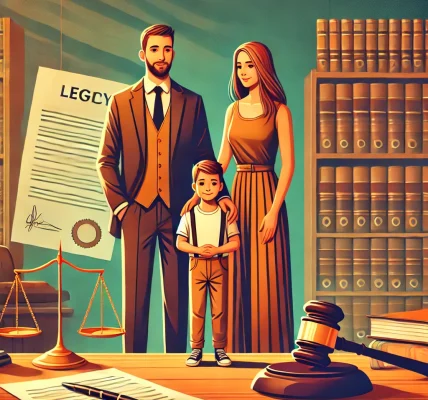Introduction
Grandparents play a crucial role in a child’s life, offering love, support, and stability. However, legal challenges may arise when they seek custody or visitation rights, especially in cases of parental divorce, separation, or the loss of a parent. Understanding the laws surrounding grandparents’ rights in child custody and visitation cases is essential for those looking to maintain a relationship with their grandchildren.
Understanding Grandparents’ Rights
Grandparents’ rights vary significantly from state to state and country to country. Generally, courts recognize that parents have primary rights to raise their children, but under certain circumstances, grandparents may be granted legal rights to visitation or custody.
Factors That Influence Grandparents’ Rights
Courts consider several factors when determining whether grandparents should be granted custody or visitation rights, including:
- Best Interests of the Child – The child’s well-being is the court’s primary concern. Grandparents must demonstrate that their involvement is beneficial to the child’s physical and emotional health.
- Existing Relationship – A strong pre-existing relationship between the grandparent and the grandchild can strengthen the case for visitation rights.
- Parental Objections – If a fit parent opposes grandparent visitation, courts usually defer to the parent’s decision unless there are compelling reasons to override it.
- Parental Unfitness – If a parent is deemed unfit due to substance abuse, neglect, or abuse, courts may consider granting custody to a grandparent.
- Death of a Parent – In many cases, if one parent passes away, grandparents may seek visitation rights to maintain a connection with their grandchild.
Legal Options for Grandparents
1. Seeking Visitation Rights
Grandparents who have been denied access to their grandchildren can petition the court for visitation rights. The process typically involves:
- Filing a petition in family court
- Demonstrating an established relationship with the grandchild
- Proving that visitation is in the best interest of the child
Many jurisdictions require that visitation must not interfere with the rights of the parents unless evidence shows that the child would suffer harm without the grandparent’s presence.
2. Pursuing Custody Rights
In extreme situations where parents are unable or unwilling to care for their children, grandparents may seek custody. This can occur if:
- Parents are deceased or incarcerated
- Parents are involved in substance abuse
- There is evidence of neglect or abuse
- The child has been abandoned
To obtain custody, grandparents must demonstrate that they can provide a stable, loving, and supportive environment for the child.
3. Guardianship vs. Custody
Sometimes, grandparents may seek legal guardianship instead of full custody. Guardianship allows them to make decisions for the child while the parents retain legal rights. This is often a temporary arrangement that provides the child with stability in difficult circumstances.
Challenges and Limitations
Despite the importance of maintaining grandparent-grandchild relationships, there are legal hurdles to overcome:
- Parental Rights Prevail – Courts prioritize parental authority and typically grant visitation only if the grandparent proves it is necessary for the child’s well-being.
- State-Specific Laws – Different states have varying laws regarding grandparent visitation and custody rights. Some states have more lenient laws, while others strictly limit such petitions.
- Financial and Emotional Burdens – Legal battles for custody or visitation can be time-consuming, expensive, and emotionally draining.
How Grandparents Can Strengthen Their Case
If grandparents are seeking custody or visitation rights, they can improve their chances by:
- Documenting their relationship with the grandchild through photos, messages, and records of time spent together.
- Gathering evidence that their presence positively impacts the child’s well-being.
- Consulting with a family law attorney to understand their rights and navigate the legal system effectively.
- Attempting mediation before litigation to find an amicable solution with the child’s parents.
Conclusion
Grandparents’ rights in child custody and visitation cases can be complex, with laws varying based on jurisdiction. While courts prioritize the best interests of the child, grandparents must provide compelling evidence to establish their role in their grandchild’s life. Seeking legal guidance and understanding the legal options available can significantly impact the outcome of such cases.




